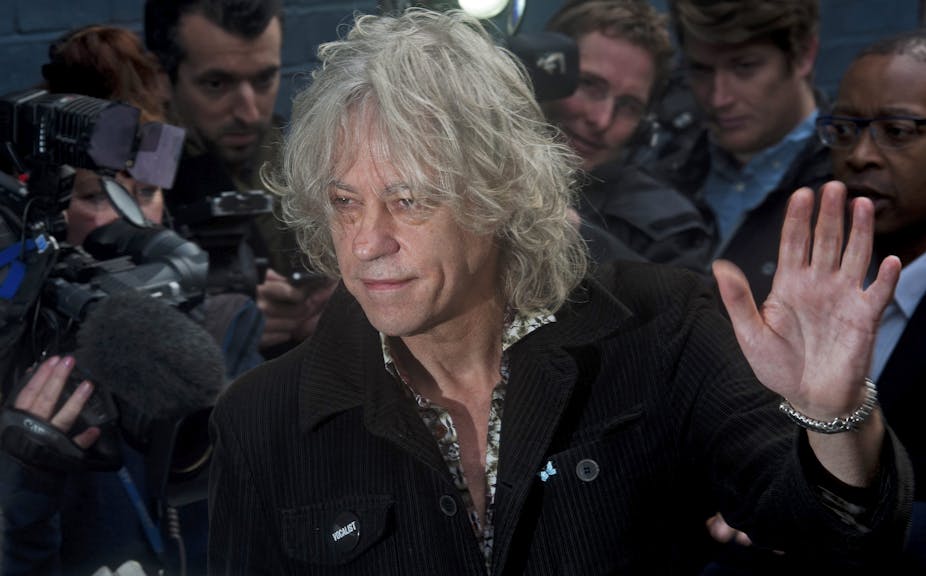It really doesn’t matter if you don’t like this song. It doesn’t matter if you hate the artists. What matters is that you buy the record.
So said the Irish songwriter Bob Geldof last weekend, in anticipation of Band Aid 30’s release of a revamped Do They Know It’s Christmas?, recorded with contemporary artists (and Bono) to raise money for the Ebola crisis.
It didn’t sound like much of a sales pitch, but so far so good. When it was launched on Britain’s X Factor on Monday night, Geldof claimed it had raised £1m within five minutes of launch.
The crisis is real, but the resurrection of the song has raised the spectre of the offence caused by the original 1984 record.
The original sold more than 6 million copies worldwide and generated enormous publicity for the Ethiopia crisis. Yet for many Africans, the song itself reproduced an overly familiar image of Africa as both barren and lacking any means of self-determination.
The idea it was up to the Western consumers to “let them know it’s Christmas time” smacked of a missionary past and was read by many as patronising a largely Christian continent.
Perhaps most offensively, it presents the image of Western, mostly white, saviours delivering the “gift of life” to Africa on behalf of a population of well-meaning consumers.
Band Aid 30 also has its critics.
African-American philanthropist and activist Solome Lemma, who organised the local initiative Africa Responds, expressed disappointment that Geldof had not chosen to work with talented local artists and written a different song.
Former Blur singer Damon Albarn commented:
There are problems with our idea of charity, especially these things that suddenly balloon out of nothing and then create a media frenzy where some of that essential communication is lost. It starts to feel like it’s a process where if you give money you solve a problem, and really giving money creates another problem.
So is there a problem with giving money, and should you buy the record?

While clearly Albarn makes reference to the symbolic inequality of charity relations between needy Africans and Western benefactors, his comments also point to a deeper concern that, rather than a meaningful form of action, buying into initiatives such as Band Aid becomes its sentimental substitute.
The concern here goes beyond the criticism that rather than focusing on the crisis we focus on celebrities. Rather, it is that a clean conscience costs only A$2.19, as consumers buy into the celebration of ourselves as members a good community, fundamentally committed to relieving suffering.
Not only are we personally relieved of the burden of knowing or doing more; we also “buy” the idea that we are part of a virtuous community that has humanitarian interest at its heart.
When British chancellor George Osborne praised Geldof, while declaring Band Aid 30 would not be taxed, he sought to translate such communitarian sentiment into political capital.
One of the much-criticised lines of the original record was “Well, tonight thank God it’s them instead of you”, though mostly for the wrong reasons. While thanking the Lord for another’s misfortune may feel icky, the deeper problem with this (now excised) lyric is a perspective that is harder to delete: the idea that “they” are suffering rather than you is simply a matter of providence or luck.
This presentation of developed-world fortune and developing-world misfortune is a familiar one, and while we may regret its apparent permanence we can assuage our conscience that we are acting to help those less fortunate.
What makes the developing world’s exposure to risk so massively disproportionate is not luck at all, but rather inequality. Poverty and a relative lack of infrastructure, among other factors, make the developing world far more vulnerable to natural, political and epidemiological crises.
The fact such crises so regularly call for our compassion indicate such inequality is a fairly permanent feature of global social relations.
Ebola provides an interesting case in this regard, as it is simultaneously reported as a humanitarian crisis and as a potential risk to our own health and security.
In recent years, “security” has provided a guiding rationale for humanitarian initiatives in the developed world. “Human security” positions humanitarian and development efforts as the means for securing global social order against the social impacts of global risks.
For its critics, the problem with this is that it is only concerned to address inequality in a superficial way: just enough so that “their” chaos does not affect – or infect - “our” order.
Celebrity initiatives such as Band Aid 30, likewise, address the symptoms of emergency rather than underlying reasons why such emergencies disproportionately arise in the developing world. Band Aid, in this respect, is an apt name for such intervention.
There is no doubt the emergency is real, and if it’s a choice between buying the record and doing nothing else my view is that – for all its faults – you probably should.
But think carefully about what you’re buying into.

